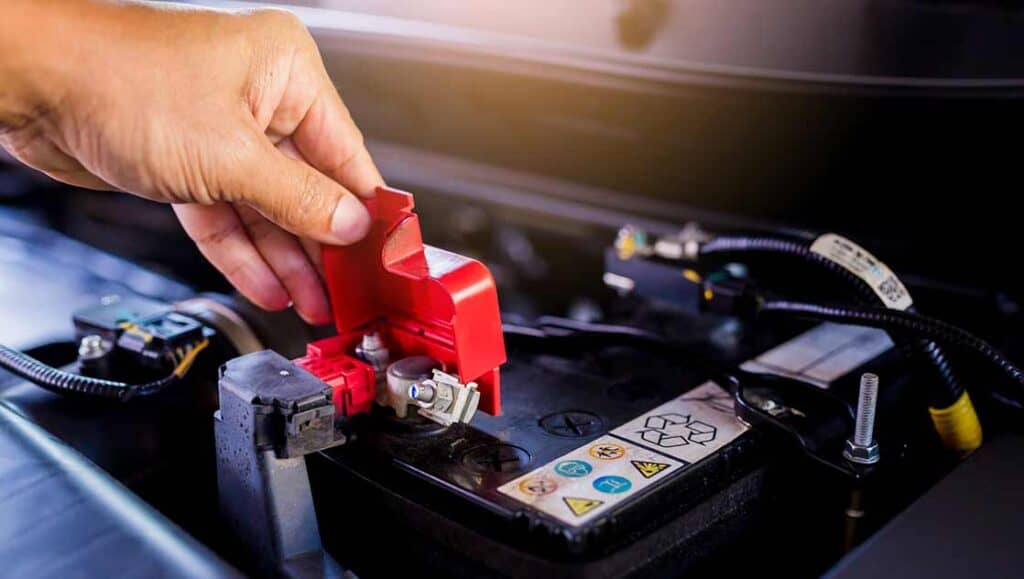According to a study, there are over 11 million households in the United States who own an RV, and this number is continuously increasing. For RV owners, having a reliable source of power for their battery is crucial for their comfort and convenience while on the road.
With various charging methods available, it can be challenging to determine which option is best for your RV. To help RV owners navigate the options available, this article provides a quick guide to charging their RV battery. It outlines the different charging methods, the factors affecting charging time, and essential battery information.
Whether you prefer using a generator, solar power, or wind power, this guide will provide you with the necessary information to power up your RV and enjoy your time on the road. So, if you’re an RV owner looking to optimize your battery’s performance, read on to discover the best charging methods and practices.

Charging Methods
Various charging methods can be utilized for RV batteries, with generator, solar power, and wind power being the most common options. Each method has its own advantages and disadvantages.
Generators, for instance, are reliable and efficient, capable of charging batteries quickly. However, they can be noisy and require fuel, which can add to the overall cost.
Solar power, on the other hand, is environmentally-friendly and free to use. It may take longer to charge batteries, but it is a cost-effective option in the long run.
Wind power, although not popular for RVs, is another renewable energy source. It requires high-speed winds to generate power and looks like windmills, which may not be appealing to some RV enthusiasts.
When choosing a charging method, it is important to consider cost comparison as well. While solar power may be free to use, installing solar panels can be expensive. Generators require fuel and maintenance, which can add up over time. Wind power may not be practical for RVs, especially for those traveling in areas with low wind speeds.
Ultimately, the decision on which charging method to use will depend on individual preferences and needs.
Factors Affecting Time
The time required to charge an RV battery is influenced by several factors.
One of the most significant factors is the size and type of the battery. Larger batteries take longer to charge, whereas smaller ones can be charged relatively quickly. The type of battery also plays a crucial role in determining the charging time. Lithium batteries are known to charge faster than lead-acid batteries, AGM, or gel batteries.
The number of batteries is another crucial factor that affects charging time. If an RV has multiple batteries, it will take longer to charge them all.
The size and power of the generator also affect the charging time. A larger generator will charge the battery faster than a smaller one.
Climate impact is another factor that affects the charging time. Cold weather can significantly reduce the charging efficiency of the battery.
It is essential to maintain and monitor the battery regularly to ensure optimal performance. Safety tips should also be followed when charging an RV battery, such as checking fuel and power, turning off appliances, and using alligator clips.
By considering these factors, RV owners can ensure that their batteries are charged efficiently and effectively.
also read : Power Up Your Truck With The Best Apus: Diesel Vs Electric And Top Brands
Battery Information
One important aspect to consider when charging an RV battery is its size. RV batteries can range from 50Ah to 400Ah, and larger batteries will require more time to charge. The charge time is measured in amp hours, and it can take several hours to charge a larger battery. It is important to note that cold weather can drain batteries faster, which may increase the charging time.
To ensure that the RV battery lasts as long as possible, it is important to perform regular battery maintenance. This includes checking the battery connections, cleaning the terminals, and monitoring the battery regularly. In addition, it is important to follow cold weather tips to prevent the battery from draining too quickly. This may include adding insulation to the battery compartment, using a battery heater, or simply turning off unnecessary appliances when the temperature drops.
- Check battery connections regularly
- Clean battery terminals to prevent corrosion
- Monitor battery regularly to prevent overcharging or undercharging
- Follow cold weather tips to prevent battery drain
Frequently Asked Questions
How often should you charge your RV battery?
The optimal charging frequency for RV batteries depends on factors such as battery type, usage frequency, and climate. Regular battery maintenance, including keeping it fully charged, can extend its lifespan and prevent damage.
Can you charge your RV battery while driving?
While charging an RV battery while driving is possible, it may strain the vehicle’s alternator and may not fully charge the battery. Benefits of solar panels and alternatives, such as a generator or shore power, may be more effective for charging on-the-go.
How long can an RV battery last on a single charge?
The lifespan of an RV battery on a single charge depends on factors such as battery size, type, and climate. Proper RV battery maintenance, including regular charging and maximizing battery life, can extend the battery’s lifespan.
Do you need to disconnect your RV battery when charging it?
To disconnect or not? Pros and cons of disconnecting your RV battery when charging; Safe charging practices for RV battery maintenance. Disconnecting the battery ensures safety and prevents damage to appliances. However, it can also cause loss of settings and inconvenience.
Can you use a portable generator to charge your RV battery?
Portable generator charging is a common alternative method for recharging RV batteries. It is important to consider the generator’s size and power, as well as the battery size and type. Other alternative charging methods include solar and wind power, but they may be less practical for RVs.